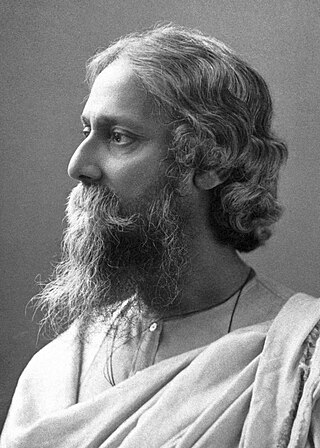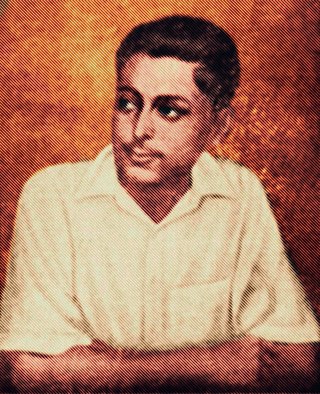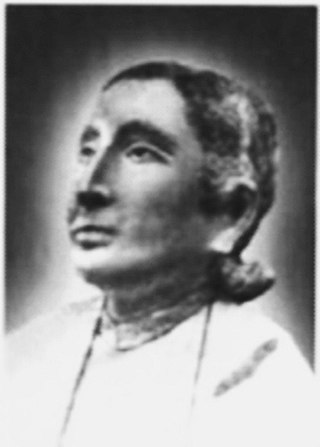
Tapan Bandyopadhyay (born 7 June 1947) is an eminent Bengali novelist. He won the Sahitya Akademi Award in 2022 for his novel Birbal. [1]

Tapan Bandyopadhyay (born 7 June 1947) is an eminent Bengali novelist. He won the Sahitya Akademi Award in 2022 for his novel Birbal. [1]
Tapan Bandyopadhyay was born in 1947 in Satkhira District. His family migrated from East Pakistan (now Bangladesh) in 1947 and settled in Baduria near Basirhat. Bandyopadhyay passed School final examination from Baduria London Missionary Society High School. He joined in Asutosh College in Kolkata and passed Mathematics Hon's with first class. [2] Bandyopadhyay joined in WBCS service in 1972 and retired as Secretary of Shishu Kishore Akademy under the Government of West Bengal. [3]
Initially Bandyopadhyay started his literary career as poet, latter he was known as a novelist and short story writer. Almost three hundred short stories of Bandopadhyay were published in various magazine and books. In 2010 he delegated Beijing 17th International Book fair, as an Indian author. [4] He created a lady Bengali detective character Goenda Gargi. In 2019, Bandopadhyay received Sahitya Akademi translation award for translating Sitakanta Mahapatra’s Odia poem collection Bharatbarsha. [5] [6]

Sunil Gangopadhyay or Sunil Ganguly was an Indian poet, novelist, short story writer, and critic in the Bengali language. He was one of the foremost poets experimenting with new forms, themes, rhythms, and words in Bengali poetry in the 1950s and 1960s. In 1953, along with Deepak Majumder and Ananda Bagchi, he founded the Bengali poetry magazine, Krittibas. He is regarded as one of the most prolific and popular writers in Bengali since Rabindranath Tagore.
Indian poetry and Indian literature in general, has a long history dating back to Vedic times. They were written in various Indian languages such as Vedic Sanskrit, Classical Sanskrit, Ancient Meitei, Modern Meitei, Telugu, Tamil, Odia, Maithili, Kannada, Bengali, Assamese, Hindi, Marathi and Urdu among other prominent languages. Poetry in foreign languages such as English also has a strong influence on Indian poetry. The poetry reflects diverse spiritual traditions within India. In particular, many Indian poets have been inspired by mystical experiences. Poetry is the oldest form of literature and has a rich written and oral tradition.

Bibhutibhushan Bandyopadhyay was an Indian writer in the Bengali language. His best known works are the autobiographical novel Pather Panchali, Aparajito (Undefeated), Chander Pahar and Aranyak.
Byomkesh Bakshi is a fictional Indian Bengali detective created by Sharadindu Bandyopadhyay. Known for referring to himself as a Satyanweshi ("truth-seeker"), Bakshi is characterized by his sharp observation, logical reasoning, and proficiency in forensic science, which he applies to solve complex murder cases, primarily set in Calcutta.

Mani Sankar Mukherjee is an Indian writer in the Bengali language, who also served as the Sheriff of Kolkata. He grew up in Howrah of West Bengal.

The Pashchimbanga Bangla Akademi is the official regulatory body of the Bengali language in India. It was founded on 20 May 1986 in Kolkata to act as the official authority of the language and is entrusted with the responsibility of reforming Bengali spelling and grammar, compiling dictionaries, encyclopedias and terminologies and promoting Bengali language and culture in West Bengal. They are widely accepted by the Governments of West Bengal and Tripura as well as a considerable number of private publishing houses and institutions such as the Oxford University Press and the Ramakrishna Mission.

Tarasankar Bandyopadhyay was an Indian novelist who wrote in the Bengali language. He wrote 65 novels, 53-story-books, 12 plays, 4 essay-books, 4 autobiographies, 2 travel stories and composed several songs. He was awarded Rabindra Puraskar, Sahitya Akademi Award, Jnanpith Award, Padma Shri and Padma Bhushan. He was nominated for Nobel Prize in Literature in 1971 and posthumously nominated in 1972.

Bengali literature denotes the body of writings in the Bengali language and which covers Old Bengali, Middle Bengali and Modern Bengali with the changes through the passage of time and dynastic patronization or non-patronization. Bengali has developed over the course of roughly 1,400 years. If the emergence of the Bengali literature supposes to date back to roughly 650 AD, the development of Bengali literature claims to be 1600 years old. The earliest extant work in Bengali literature is the Charyapada, a collection of Buddhist mystic songs in Old Bengali dating back to the 10th and 11th centuries. The timeline of Bengali literature is divided into three periods: ancient (650–1200), medieval (1200–1800) and modern. Medieval Bengali literature consists of various poetic genres, including Hindu religious scriptures, Islamic epics, Vaishnava texts, translations of Arabic, Persian and Sanskrit texts, and secular texts by Muslim poets. Novels were introduced in the mid-19th century. Nobel laureate Rabindranath Tagore is the best known figure of Bengali literature to the world. Kazi Nazrul Islam, notable for his activism and anti-British literature, was described as the Rebel Poet and is now recognised as the National poet of Bangladesh.

The Sahitya Akademi Award is a literary honour in India, which the Sahitya Akademi, India's National Academy of Letters, annually confers on writers of the most outstanding books of literary merit published in any of the 22 languages of the 8th Schedule to the Indian constitution as well as in English and Rajasthani language.

Shaktipada Rajguru was an Indian Bengali writer. Several of his novels have been adapted for the screen including the Ritwik Ghatak-directed Meghe Dhaka Tara and the Shakti Samanta-directed Amanush. His stories have been translated into Hindi, Tamil, and Malayalam.
Dibyendu Palit was an Indian writer of Bengali poems, novels, and short stories. His first story Chandapatan was published in 1955 in the Sunday edition of Anandabazar Patrika.
Bankim Puraskar is the highest award given by the Government of West Bengal for contribution to Bengali fiction. The award was instituted in 1975 in memory of Bankim Chandra Chattopadhyay, a famous Bengali novelist of the 19th century. It has been brought under the aegis of Paschimbanga Bangla Akademi, functioning under the Department of Information & Cultural Affairs, in 2003. The award is handed over by the Chief Minister of West Bengal.

Nimtala Crematorium is located on Beadon Street, Kolkata, India. The crematorium is also historically known as Nimtala burning ghat, or simply Nimtala ghat. Located on the banks of Hoogly (Ganga) just like the Manikarnika Ghat in Varanasi; it is considered to be one of the holiest burning ghats in the country where the soul is said to attain moksha, ie. breaking the cycle of birth and death. So people across the country comes here for the cremation of their loved ones. It is also one of the largest burning ghats in the country, being located in Kolkata.

Chinmoy Guha is Professor Emeritus at the University of Calcutta, an Indian essayist and translator of Bengali, and a scholar of French language and literature. He has served as the Vice-Chancellor of Rabindra Bharati University and Director of Publications, Embassy of France, New Delhi. Earlier he taught English at Vijaygarh Jyotish Ray College in Kolkata for more than two decades, and French at the Alliance Française and the Ramakrishna Mission Institute of Culture for eleven and five years respectively.
Asit Bandopadhyay was a Bengali playwright, screenwriter, actor and director. He was associated with the Nandikar theater group. He lived and worked in Kolkata, India.

Pratima Bandopadhyay was a Bengali playback singer from Kolkata, who sang numerous songs in popular Bengali language movies and non-film as well, particularly during the 1940s, 50s, 60s and 70s. She was also known as Pratima Banerjee.

Rameshwar Banerjee was a revolutionary and martyr of the Indian independence movement. He participated in the Quit India Movement in 1942.

Ramapada Chowdhury was a Bengali-language novelist and short story writer in India. For his novel Bari Badle Jay, he received the Sahitya Akademi Award in 1988. He was also a recipient of the Rabindra Puraskar and several other awards. He won the Rabindranath Tagore Memorial International Prize in its inaugural year. Many of his works have been adapted into films, including the multiple-award-winning Kharij, directed by Mrinal Sen, and Ek Doctor Ki Maut, directed by Tapan Sinha. Chowdhury started writing during the Second World War. He was associated with Anandabazar Patrika for many years, and edited its Sunday supplement. His novels are marked by an economy of expression. He is one of the most well known short story writers in contemporary Bengali literature.

Rangalal Bandyopadhyay was a Bengali poet, journalist, and author.